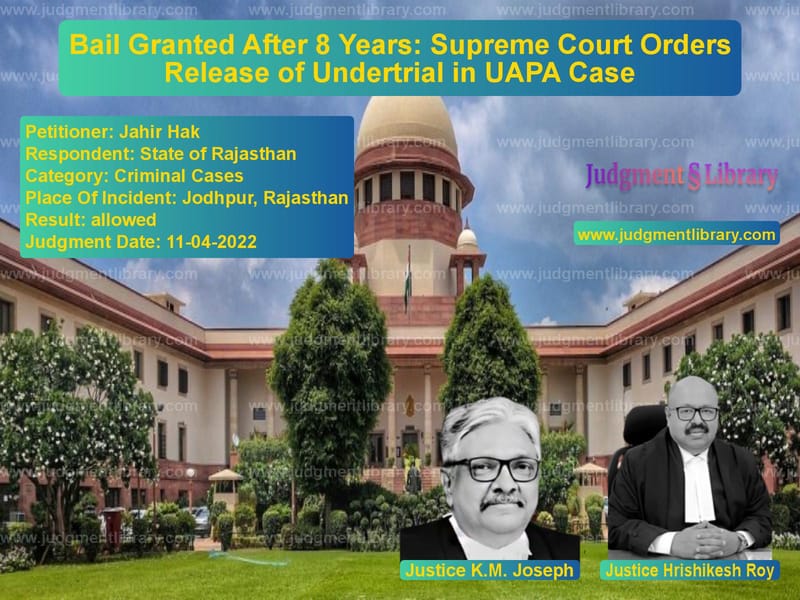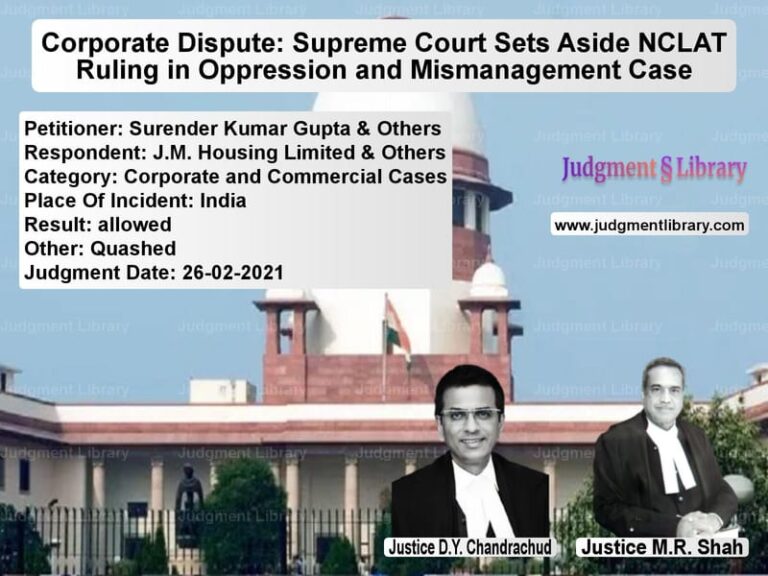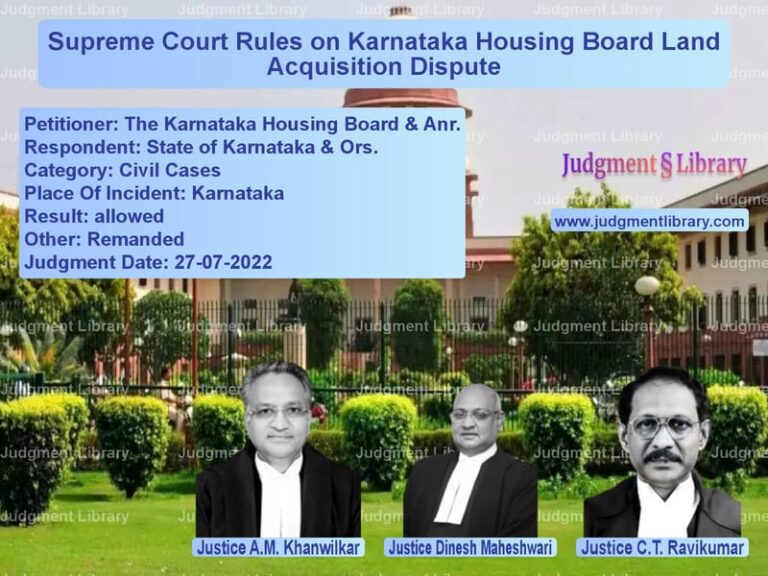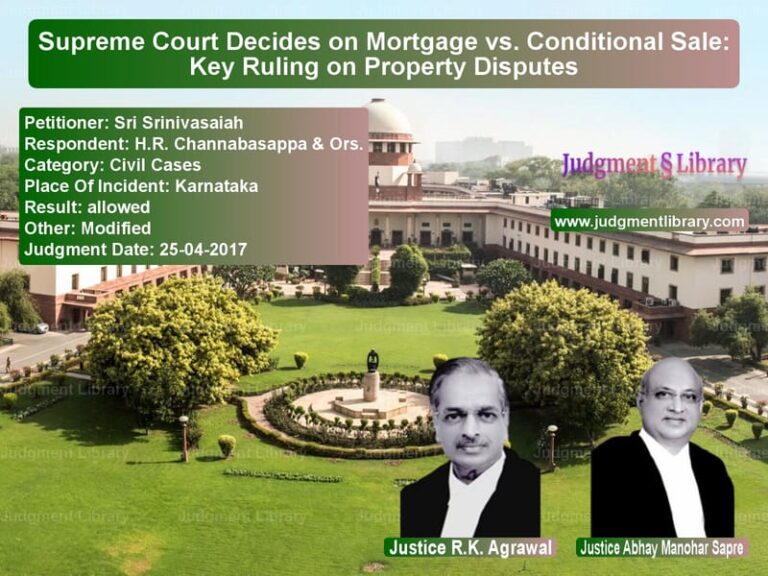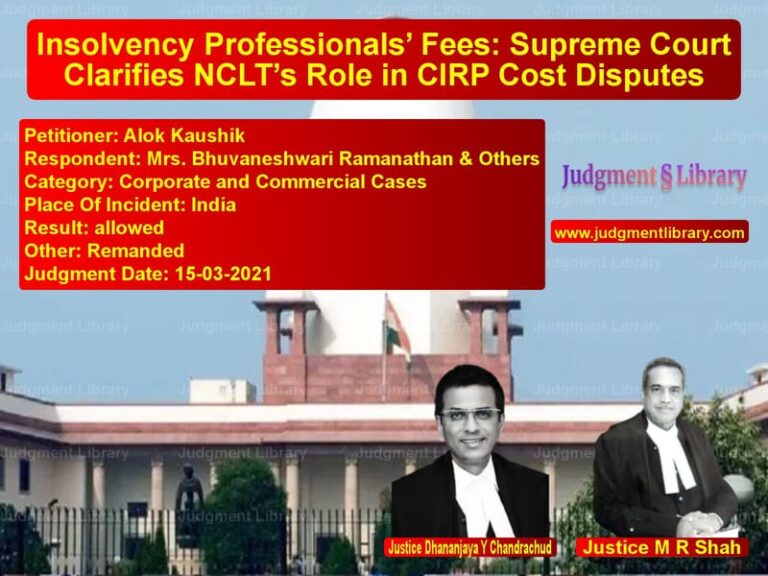Bail Granted After 8 Years: Supreme Court Orders Release of Undertrial in UAPA Case
The Supreme Court of India recently ruled in favor of Jahir Hak, an undertrial prisoner charged under the Unlawful Activities (Prevention) Act, 1967 (UAPA). The case revolved around his prolonged incarceration without trial progress, leading the Court to grant him bail after eight years in custody. The judgment underscores the principle that extended pre-trial detention violates the fundamental rights of accused individuals, especially when trial delays are excessive.
The ruling clarifies the scope of bail under UAPA, particularly in cases where trial delays are prolonged, and highlights the Court’s responsibility to uphold personal liberty. The judgment also sets a precedent on ensuring that stringent anti-terror laws do not result in undue hardship for undertrials.
Background of the Case
Jahir Hak was arrested on May 8, 2014, in connection with FIR No. 113/2014 at Pratapnagar Police Station, Jodhpur, for offenses under multiple sections of the UAPA, including Sections 10, 13, 15, 16, 17, 18, 18A, 18B, 19, 20, 23, and 38. The case was linked to allegations of association with a banned organization.
The prosecution filed a chargesheet against him on September 17, 2014, and charges were framed on January 29, 2018. However, by the time the Supreme Court heard his appeal, only six out of the 109 prosecution witnesses had been examined, and the trial court estimated that it would take at least another 2-3 years to conclude proceedings.
Jahir Hak had previously sought bail from the Rajasthan High Court, which was denied on March 24, 2021. The Supreme Court subsequently heard his appeal and ruled in his favor.
Petitioner’s Arguments
Jahir Hak’s legal team, led by Advocate Mohd. Irshad Hanif, argued that:
- He had already been in custody for eight years without significant trial progress.
- Despite the prosecution citing 109 witnesses, only six had been examined in the past eight years.
- The trial court’s report suggested that it could take another 2-3 years to complete the proceedings, further extending his incarceration.
- Keeping an undertrial in custody for such a long period amounts to a violation of his fundamental rights.
- He was not the principal accused and was primarily alleged to have communicated with another accused person.
- Another co-accused, Aadil Ansari, had already been granted bail on September 30, 2020, and thus, he should be treated similarly.
Respondent’s Arguments
The State of Rajasthan, represented by Advocate Pragati Neekhra, opposed the bail application on the following grounds:
- The charges against the accused were serious and pertained to national security.
- The case involved multiple accused persons, and Jahir Hak was in touch with a co-accused believed to be the head of a sleeper cell of a banned organization.
- Some witnesses had expressed fear in deposing against the accused, and there was a risk of witness intimidation.
- The UAPA imposes strict conditions for bail, requiring the court to be satisfied that there is no prima facie case against the accused.
Supreme Court’s Judgment
The Supreme Court bench, comprising Justices K.M. Joseph and Hrishikesh Roy, ruled in favor of the petitioner, granting him bail. The key observations made by the Court were:
- Excessive Pre-Trial Detention: The Court noted that the petitioner had already spent nearly eight years in custody without trial completion, making his continued incarceration unjustified.
- Unreasonable Trial Delay: The Court considered the trial court’s report stating that the case would take another 2-3 years, leading to a potential total detention period of over a decade before conviction.
- UAPA Bail Considerations: While acknowledging the stringent bail conditions under UAPA, the Court held that long pre-trial detentions weaken the justification for denying bail.
- No Strong Prima Facie Case: The Court found that the allegations against Jahir Hak primarily involved communication with a co-accused, and the prosecution had not established strong evidence linking him to violent activities.
- Similar Treatment as Co-Accused: The Court noted that another co-accused had already been granted bail, reinforcing the argument that Jahir Hak should be granted similar relief.
- Protection of Witnesses: The Court directed the prosecution to take necessary steps to ensure witness protection but ruled that this alone was not sufficient to deny bail.
Implications of the Judgment
This ruling has significant implications for cases involving pre-trial detention under UAPA:
- Protection of Undertrial Rights: The decision ensures that prolonged incarceration without trial progress does not violate fundamental rights.
- Balancing National Security and Personal Liberty: The ruling establishes that even in UAPA cases, courts must weigh the length of custody against the risk posed by the accused.
- Precedent for Future UAPA Bail Applications: The judgment clarifies that long trial delays can be a valid ground for bail, even under stringent laws.
- Accountability in Trial Progress: The case highlights the need for prosecution agencies to expedite trials instead of relying on extended custody.
Conclusion
The Supreme Court’s ruling in Jahir Hak vs. State of Rajasthan is a landmark decision reinforcing the principles of justice and personal liberty. By granting bail after eight years of pre-trial detention, the Court has set an important precedent ensuring that anti-terror laws do not lead to indefinite imprisonment without trial completion. The judgment serves as a vital reminder that judicial scrutiny must always balance national security concerns with the fundamental rights of the accused.
Petitioner Name: Jahir Hak.Respondent Name: State of Rajasthan.Judgment By: Justice K.M. Joseph, Justice Hrishikesh Roy.Place Of Incident: Jodhpur, Rajasthan.Judgment Date: 11-04-2022.
Don’t miss out on the full details! Download the complete judgment in PDF format below and gain valuable insights instantly!
Download Judgment: jahir-hak-vs-state-of-rajasthan-supreme-court-of-india-judgment-dated-11-04-2022.pdf
Directly Download Judgment: Directly download this Judgment
See all petitions in Bail and Anticipatory Bail
See all petitions in Custodial Deaths and Police Misconduct
See all petitions in Terrorist Activities
See all petitions in Judgment by K.M. Joseph
See all petitions in Judgment by Hrishikesh Roy
See all petitions in allowed
See all petitions in supreme court of India judgments April 2022
See all petitions in 2022 judgments
See all posts in Criminal Cases Category
See all allowed petitions in Criminal Cases Category
See all Dismissed petitions in Criminal Cases Category
See all partially allowed petitions in Criminal Cases Category

